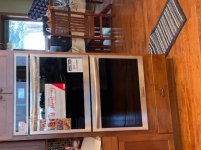DavidScott
Diamond
- Joined
- Jul 11, 2012
- Location
- Washington
I am looking for a way to controllably heat a minimum 1"x2"x7" aluminum bar to 320f for a 10 minute cycle to cure a resin. I am thinking of a controller with a sensor driving a cartridge heater or two. This is outside of my realm so I am asking for help picking it out. Once picked out I can figure out the rest. This is a Harry Homeshop adventure in some ways so cosmetics don't matter, but it is professional so no Ebay or Amazon cheap. I want to leave some headroom on size so any info would be appreciated. I am thinking of about 5 minutes from shop to full temp. I am guessing a 250 watt cartridge heater but that is just a guess. I don't know enough about this to know if I have given enough info or not so please let me know what I am missing.
Thanks in advance for all your responses.
Thanks in advance for all your responses.


